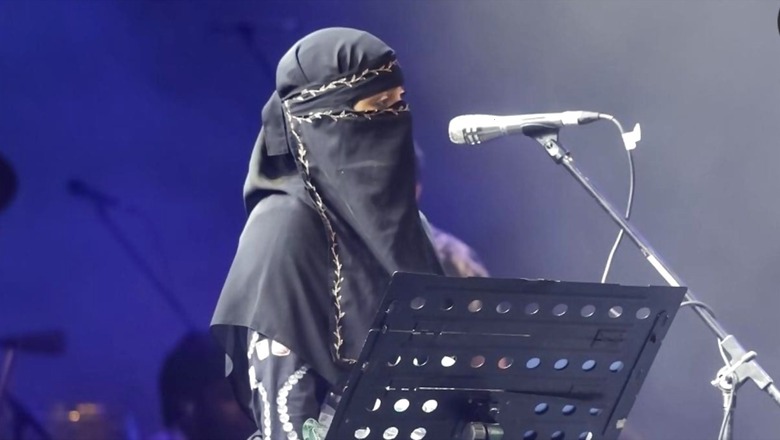
views
Step into the world of Khatija Rahman, and you’ll find yourself in a swirl of soul-soothing music, a quiet yet fierce sense of individuality, and an artist steadily carving her own path in the music industry. This time, she was at the vibrant and lively Red FM’s ‘South Side Story’, her first-ever performance in Delhi, backed by a live band she personally assembled for the occasion.
But there’s so much more to her story—one that mixes the weight of legacy with the freshness of experimentation, all while trying to craft a unique sound in a world that sometimes expects her to follow in the footsteps of her legendary father, AR Rahman. So, let’s dive into this exclusive conversation with News18 Showsha and follow Khatija’s journey from singer to composer and bandleader!
First Time in Delhi – With a Band!
For most performers, stepping into the capital city of India is always a big deal. But for Khatija, it’s not just about performing in Delhi for the first time—it’s about debuting with her band at Red FM’s ‘South Side Story’. “I’m excited to meet different bands that I’ve admired, and it could even lead to future collaborations!” Khatija beams, her eyes twinkling with excitement. For her, the event feels like a homecoming, especially since it’s themed around the South and features many Malayali attendees. “It doesn’t feel like I’m somewhere else. I feel comfortable,” she says, adding a touch of nostalgia to her excitement.
What makes this performance extra special is that Khatija formed a band specifically for this event. Yes, you read that right! A brand-new band. “Before this, I was performing solo. So, this has been a completely different experience—making a band, rehearsing, and learning together,” she explains. The music? Well, it’s all going to be acoustic and live. “No playback tracks! That’s what makes it special,” she adds, smiling. And it’s clear that the project has been a labor of love for Khatija, who collaborated with arranger and conductor Kalyani Nair. “We just spoke about doing something together, and this opportunity came along—it felt like God answered my prayers,” she laughs.
The Leap from Singer to Composer: Enter Minmini
It’s not every day that a singer decides to add “composer” to their resume, but Khatija did just that with her debut as a composer for the film Minmini. The result? A wave of adoration from fans and critics alike. So how did she handle this transition from singer to composer?
“I had to unlearn my ego,” Khatija admits with a candidness that feels refreshing. “It’s not about you or your music—the film is the bigger purpose here.” The process was transformative for her, not only as an artist but as a person. “I didn’t expect this transition, and it’s like God just had it in store for me. I’m thankful for everything that’s happened this year—my first live show with a band and my first film. It’s been incredible.”
Navigating the Legacy of AR Rahman: Finding Her Own Sound
It’s no secret that being the daughter of the legendary AR Rahman comes with its own set of expectations. But for Khatija, creating her own sound is a journey she’s taking one step at a time. When asked about balancing the weight of her father’s legacy with her desire to carve her own path, Khatija is candid. “There’s always pressure—especially when forming the band and working on my own music. But I’m learning. I don’t have any formula for it,” she admits.
And what about AR Rahman’s feedback on her work? “He heard my first single and said it was calm and refreshing. He also encouraged me to find my own sound,” she recalls. That kind of support must mean the world, but Khatija remains grounded, taking each day as it comes.
Lata Mangeshkar: The Soul of Khatija’s Musical Journey
Lata Mangeshkar holds a special place in Khatija’s heart. In fact, her debut EP, ‘Kuhu Kuhu’, was a tribute to the legendary singer. Although Khatija never got the chance to meet Lataji in person, she fondly remembers the day when the legendary vocalist heard her song ‘Farishton’ and appreciated her voice. “That meant something to me,” Khatija says softly.
The EP itself was a labor of love and learning. It took Khatija years to perfect her renditions of Lataji’s iconic songs. “It wasn’t easy—it required a lot of practice and discipline. But it was a good challenge, and I learned so much from it,” she explains. For Khatija, Lata Mangeshkar is the epitome of what she aspires to be as a singer. “If I can even do 1% of what she did, I’d feel like my purpose in life is fulfilled,” she says, with a look of pure admiration.
A Global Vision with Tamil Roots: ‘Sagavaasi’ and Collaborations with Arivu
When it comes to blending local culture with global appeal, Khatija hits all the right notes. Her song ‘Sagavaasi’, created in collaboration with lyricist Arivu, is a perfect example. The track explores themes of Tamil culture and nature while reaching a global audience. But how does one strike that balance?
“All credit goes to Arivu,” Khatija insists. “His concept is timeless. Even if you listen to it a hundred years from now, it will still resonate.” She describes their working relationship as magnetic—full of positive energy and creativity. “He takes his time, but when he comes up with something, it’s there forever. His lyrics are so powerful that they will always remain relevant.”
For the first time ever, Khatija and Arivu joined forces on stage to perform their track live at ‘South Side Story’, cranking up the excitement and giving the crowd a musical moment to remember!
Cultural Representation and Rebellion Through Art
Cultural representation isn’t just a theme for Khatija—it’s her mission. Whether it’s through her music videos or the collaborations she chooses, Khatija is committed to showcasing diversity and coexistence. “During the COVID-19 pandemic, there was a lot of negativity, especially towards minorities,” she says, recalling those difficult times. “Through art, I can speak, rebel, and convey my message. This piece of art is something I will cherish forever.”
Her song ‘Farishton’ is a testament to this idea, as it brings together a variety of cultural elements to create something that feels both universal and deeply personal.
Imposter Syndrome and Stage Fright: Yes, Even Khatija Feels It
Khatija’s candidness extends to her own struggles with imposter syndrome and stage fright. “I crib every day!” she laughs, sharing how she still gets nervous, even today. “I went to my manager, and I told her how nervous I was. Sometimes I go into a spiral of feeling like I should have figured it all out by now.”
But instead of avoiding these feelings, Khatija chooses to face them head-on. “I’m learning not to escape but to deal with stage fright. I talk about it with others, and it helps to know that I’m not alone. When people share their experiences, it makes me feel better,” she explains. In a world that often expects artists to project confidence 24/7, Khatija’s vulnerability is a breath of fresh air.
Dealing with Fame: Here Today, Gone Tomorrow
Fame—an elusive, ever-changing force in the life of an artist. Khatija knows this all too well, having taken a seven-year break from the limelight to process her feelings about it. Now that she’s back, how does she view fame?
“I think fame is not permanent. Today they’ll keep you up, and tomorrow they’ll put you down. So it’s better to just do your stuff and move on,” she says pragmatically. Khatija’s relationship with fame is rooted in the idea that true fulfillment comes from within. “Of course, I’d love for people to resonate with my music, but ultimately, I’m working for myself.”
Brotherly Love and Musical Disagreements
Khatija’s brother, AR Ameen, is another rising star in the music world. But do the siblings always see eye to eye? “No!” Khatija laughs. “Sometimes it doesn’t match. I’ll show him my work, and it won’t click with him. But it’s good that we disagree—it shows we’re two different people.”
Despite the occasional disagreements, Khatija shares a close bond with her younger brother. “He’s completely pampered, but I won’t say more—he’ll get mad if he sees this!” she says, giggling. “It’s such a blessing to have a younger brother.”
Empowering Women Through Music
Khatija is a firm believer in using her platform to uplift others—especially women. Whether it’s supporting female indie musicians, hiring female recording engineers, or ensuring her band has a gender balance, she’s committed to making real changes in the industry. “Even in my band, I try to keep a 50-50 balance between men and women,” she explains. “It’s about making those small changes that can have a big impact.”
World Music As Inspiration: Blurring Boundaries
The influence of world music is a recurring theme in Khatija’s work, and she believes that the Indian music scene can learn a lot from it. “It’s already happening,” she says, adding, “Composers like Santhosh Narayanan, G.V. Prakash, and my brother are doing amazing things. It’s nice to see this influence.”
Looking Ahead: Balancing Composing, Indie, And The Band Life
So what’s next for Khatija Rahman? Balancing her indie music career, live performances, and film compositions is no easy feat. But she’s determined to find her rhythm. “I want to put out more tracks, collaborate with more people, and not rush things. Even if I release a song every six months, I want to do it right,” she explained.
And when it comes to film projects, Khatija is clear on her priorities. “If someone asks me to deliver something in a month, I’ll straightaway say no!” she laughs. Quality over quantity is her motto, and she’s not afraid to turn down big projects if they don’t align with her vision or timeline.
With her first live band performance, composing debut, and several projects in the pipeline, Khatija Rahman is on a journey that’s uniquely her own.















Comments
0 comment